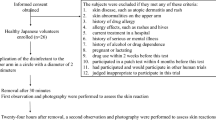Abstract
To determine the efficacy, safety and effect on fecal flora of ciprofloxacin in the prevention of travelers' diarrhea, 54 volunteers traveling to Tunisia were randomized in a double-blind manner to receive either 500 mg ciprofloxacin or a placebo once daily for one week. Results of 53 volunteers were available for evaluation of efficacy. One of 25 subjects (4%) receiving ciprofloxacin versus 18 of 28 subjects (64%) in the placebo group experienced travelers' diarrhea (p<0.0001). The protection offered by ciprofloxacin was 94 %. In one volunteer taking ciprofloxacin, prophylaxis was terminated due to sunburn with blistering. Among 41 subjects reporting sunburn, no statistical difference was observed between the two treatment groups in the percentage of body surface area of sunburn. Quantitative feces cultures revealed a marked decrease in the number of gram-negative organisms in volunteers receiving ciprofloxacin and a significant increase in the number ofEscherichia coli in the placebo group. Five weeks after return, the aerobic bacterial flora of both treatment groups showed the pre-travel pattern.
Similar content being viewed by others
References
Steffen, R.: Epidemiologic studies of travelers' diarrhea, severe gastrointestinal infections and cholera. Reviews of Infectious Diseases 1986, 8, Supplement 2: 122–130.
Steffen, R., van der Linde, F., Gyr, K., Schar, M.: epidemiology of diarrhea in travelers. Journal of the American Medical Association 1983, 249: 1176–1180.
Ryder, R. W., Quist, C. A., Greenberg, H., Taylor, D. N., Ørskov, F., Ørskov, I., Kapikian, A. Z., Sack, R. B.: Travelers' diarrhea in Panamanian tourists in Mexico. Journal of Infectious Diseases 1981, 144: 442–448.
Sack, D. A., Kaminsky, D. C., Sack, R. B., Itotia, J. N., Arthur, R. R., Kapikian, A. Z., Ørskov, F., Ørskov, I.: Prophylactic doxycycline for travelers' diarrhea: results of a prospective double-blind study of Peace Corps volunteers in Kenya. New England Journal of Medicine 1978, 298: 758–763.
DuPont, H. L., Galindo, D., Evans, G., Cabada, F. J., Sullivan, P., Evans, D. J.: Prevention of travelers' diarrhea with trimethoprim-sulfamethoxazole and trimethoprim alone. Gastroenterology, 1983, 84: 75–80.
Black, F. T., Gaarslev, K., Ørskov, F., Ørskov, I., Stenderup, A., Stenderup, J., Christensen, O.: Mecillinam, a new prophylactic for travellers' diarrhea. Scandinavian Journal of Infectious Diseases 1983, 15: 189–193.
Ericsson, C. D., DuPont, H. L., Sullivan, P., Galindo, E., Evans, D. G., Evans, D. J.: Bicozamycin, a poorly absorbable antibiotic, effectively treats travelers' diarrhea. Annals of Internal Medicine 1983, 98: 20–25.
Wistrom, J., Norrby, S. R., Burman, L. G., Lundholm, R., Jellheden, B., Englund, G.: Norfloxacin versus placebo for prophylaxis against travellers' diarroea. Journal of Antimicrobial Chemotherapy 1987, 20: 563–574.
Johnson, P. C., Ericsson, D. R., DuPont, H. L., Cabada, F. J.: Lack of emergence of resistant fecal flora during successful prophylaxis of travelers' diarrhea with norfloxacin. Antimicrobial Agents and Chemotherapy 1986, 30: 671–674.
Murray, B. E.: Resistance ofShigella, Salmonella and other selected enteric pathogens to antimicrobial agents. Reviews of Infectious Diseases 1986, 8, Supplement 2: 172–181.
Neu, H. C.: Clinical use of the quinolones. Lancet 1987, ii: 1319–1322.
Rozenberg-Arska, M., Dekker, A. W., Verhoef, J.: Ciprofloxacin for selective decontamination of the alimentary tract in patients with acute leukemia during remission induction treatment: the effect on fecal flora. Journal of Infectious Diseases 1985, 152: 104–107.
Merson, M. H., Morris, G. K., Sack, D. A., Wells, J. G., Feeley, J. C., Sack, R. B., Creech, W. B., Kapikian, A. Z., Gangarosa, E. J.: Travelers' diarrhea in Mexico: a prospective study of physicians and family members attending a congress. New England Journal of Medicine 1976, 294: 1299–1305.
Rönnberg, B., Wadström, T.: Rapid detection by a coagglutination test of heat-labile enterotoxin in cell lysates from blood agar-grownEscherichia coli. Journal of Clinical Microbiology 1983, 17: 1021–1025.
Consensus Development Conference Statement. Reviews of Infectious Diseases 1986, 8, Supplement 2: 227–233.
Anonymous: Travellers' diarrhoea. Lancet 1982, i: 777–778.
DuPont, H. L., Ericsson, C. D., Johnson, P. C., Bitsura, J. M., DuPont, M. W., Cabada de la, F. J.: Prevention of travelers' diarrhea by the tablet formulation of bismuth subsalicylate. Journal of the American Medical Association 1987, 257: 1347–1350.
Author information
Authors and Affiliations
Rights and permissions
About this article
Cite this article
Rademaker, C.M.A., Hoepelman, I.M., Wolfhagen, M.J.H.M. et al. Results of a double-blind placebo-controlled study using ciprofloxacin for prevention of travelers' diarrhea. Eur. J. Clin. Microbiol. Infect. Dis. 8, 690–694 (1989). https://doi.org/10.1007/BF01963753
Issue Date:
DOI: https://doi.org/10.1007/BF01963753




